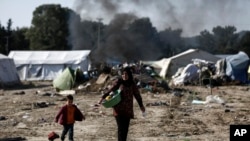The United Nations refugee agency says it is upset about the sub-standard conditions in which refugees and migrants are living in northern Greece and is urging the government to move them to better sites.
Some 8,000 refugees and migrants—mostly Syrians, Afghans, and Iraqis—were moved this week from a squalid makeshift site at Idomeni, on the Greek border with Macedonia, to several other sites in northern Greece.
The U.N. refugee agency agrees conditions in Idomeni were abysmal, but notes the people have been transferred to sites that are also well below minimum standards.
UNHCR spokeswoman Melissa Fleming says some people have been packed into derelict warehouses and factories with insufficient air circulation, low food supplies in these places are poor and supplies of food, water, toilets, showers, and electricity are insufficient.
“Obviously, this compounds the distress of the refugee and migrant families. And, this is also fueling tensions between the populations and it is also complicating our efforts to provide the required assistance and protection," said Fleming.
The UNHCR is calling on the Greek government to immediately identify and establish new sites that are in full compliance with basic humanitarian requirements.
On a related issue, Fleming tells VOA the UNHCR has modified its policy regarding thousands of refugees and migrants in detention centers on several Greek islands. They are forced to remain there while waiting to be processed and sent to Turkey as part of a deal with the European Union.
The UNHCR opposes mandatory detention and, as a matter of policy, refuses to assist people being held against their will. But, Fleming says her agency is softening this position and has decided to provide aid in these facilities.
“UNHCR is again present. We are monitoring the situation there…It is very difficult for us to stand by and see people suffering in poor conditions ," said Fleming. " So we are increasing our assistance inside those facilities.”
Fleming says the UNHCR is actively working with the authorities on alternative solutions to detention. She says the UNHCR has had some success in getting the authorities to move vulnerable people, such as the sick, women and children, out of places of detention and into open facilities.




